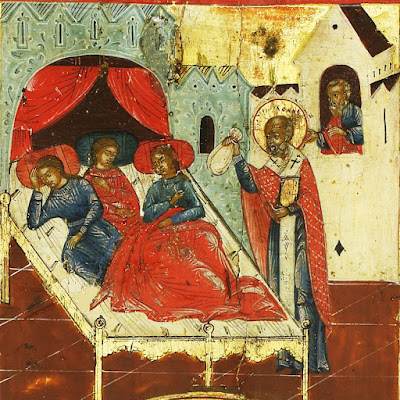Dear Parish Faithful,
"But you, O Bethlehem Ephrathah, who are so little to be among the clans of Judah,from you shall come forth for me one who is to be ruler in Israel, whose origin is from of old, from ancient of days." (Micah 5:2)
"In these days" it is almost banal and trite to offer one more Christian critique of the crass commercialization of Christmas. For the simple reason that the pervasiveness of this phenomenon has become integral to the "American way of life" on an annual basis. But as Fr. Thomas Hopko has once written, we cannot, in response, grimace and gnash our teeth while swearing to "put Christ back into Christmas." That is a clearly a dead-end approach.
I wrote an earlier mediation that acknowledged the uneasy tension between the asceticism of the Fast and the consumerism of the holiday season. Our goal as Orthodox Christians is to somehow navigate our way through that terrain in such a way that the overall integrity of the Feast of the Lord's Nativity retains a place within our homes - and hopefully in our minds and hearts. Yet, to remind us of just how pervasive the droning of Christmas sales drowns out the Gospel proclamation of the Incarnation of the Word, I recently found this poem that I am sharing here. I am not a good judge of the quality of poetry, but this poem has a share of images and lines that nicely express the point:
Hush that anguished hymn you’re humming:
“Come, O Come, Emmanuel.”
Trumpet Christmas! Fix his coming
firmly at “The First Nowell.”
He’s already come in glory!
Why plead, “Savior, come at last”?
Let’s talk Christmas! Tell a story
safely in the distant past.
Drown out John the Baptist. Edit
out “Prepare! Make straight the way!”
Cut to Christmas! Buy on credit.
Square things up another day.
Advent’s dreary. Let’s start living
Christmas now! Wear red and green!
While we’re at it, skip Thanksgiving!
Deck the halls at Halloween!
Then, when the Incarnate Verb
overnight becomes passé,
carry Christmas to the curb.
Pack the Prince of Peace away.
- Julie Stoner (2009)
The line about "Buy on credit" has a certain resonance today, as I have recently read more than one article about the skyrocketing of credit card debt that Americans are dealing with. And with the Christmas season - and let's not lose the irony of this - that debt is shooting into the stratosphere.
Are there some practical steps that we could take to create some balance in our lives as we approach the Feast? I would offer this humble suggestion: We will serve the pre-festal Vespers together with an appropriate reading to follow on Monday - Thursday, December 19-22. And the Royal Hours on Friday morning, December 23. As the Nativity has been called the "Winter Pascha" (Fr. Alexander Schmemann) these services are something of a "holy week" before the Feast, though far less intense then the Holy Week before Pascha. Make a point of attending at least one of those Vespers for some reorientation toward the "Orient from on high." Or the Royal Hours which offer an incredible insight into the scriptural passages that proclaim the coming of Christ. Christianity at its most expressive has always challenged prevailing cultural and social norms. In fact, it has often been "counter-cultural." Our role is to maintain that tradition on some level.












